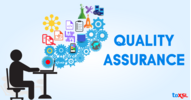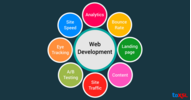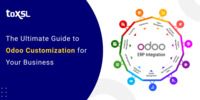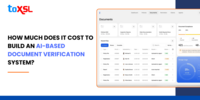- May 24, 2023
- ERP/CRM Applications
- 8031
Share this post on:
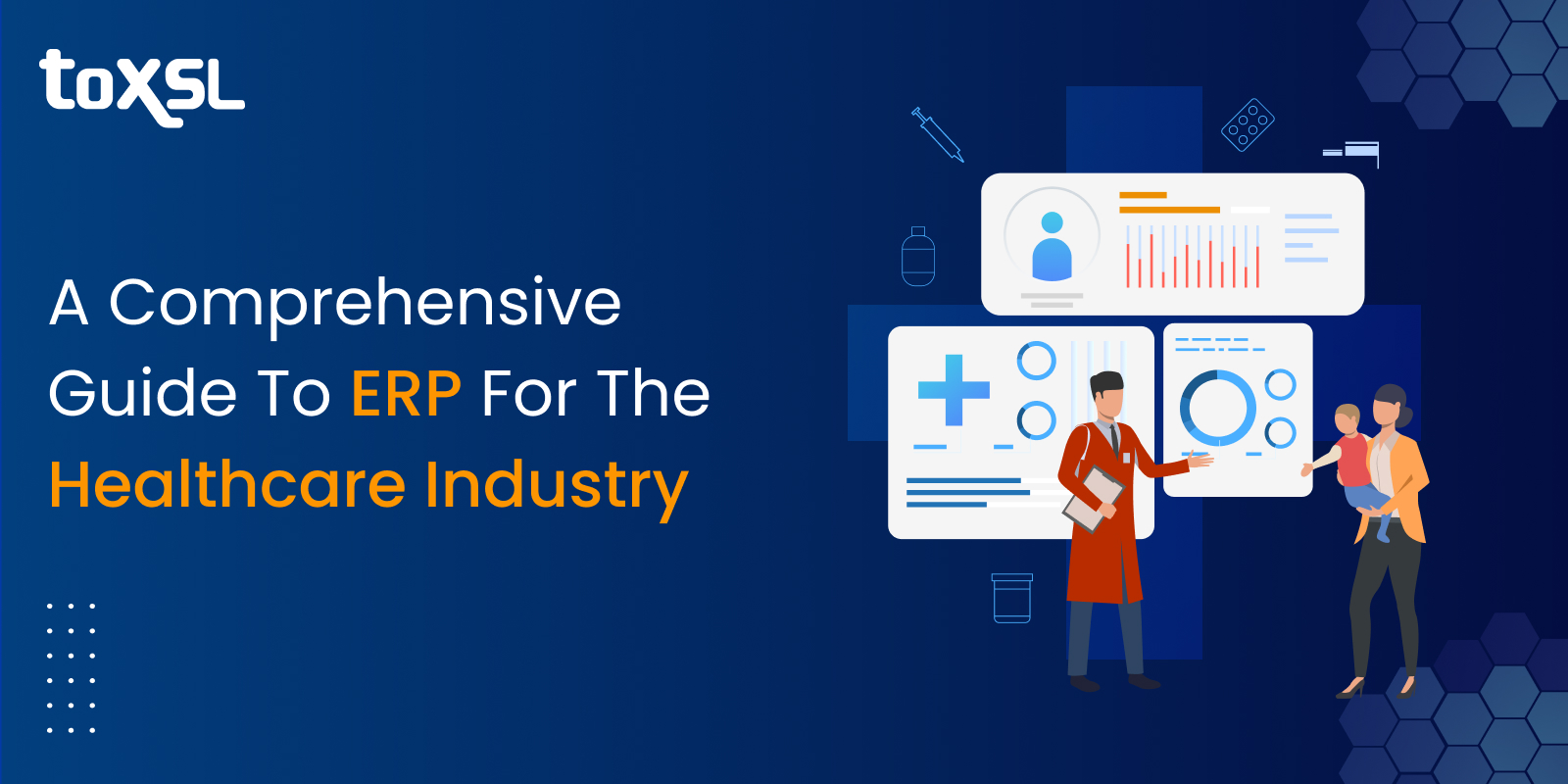
Businesses across various industries use Enterprise Resource Planning (ERP) systems to streamline operations and improve efficiency. In recent years, ERP systems have gained popularity in the healthcare sector due to their potential to improve patient care, reduce costs, and enhance organizational performance.
By implementing ERP systems in hospitals and other healthcare providers, they can operate more efficiently and effectively while providing better outcomes. Overall, adopting ERP technology has proven to be a worthwhile investment that is transforming the way the healthcare industry works.
Let us see what the stats say about ERP in healthcare:
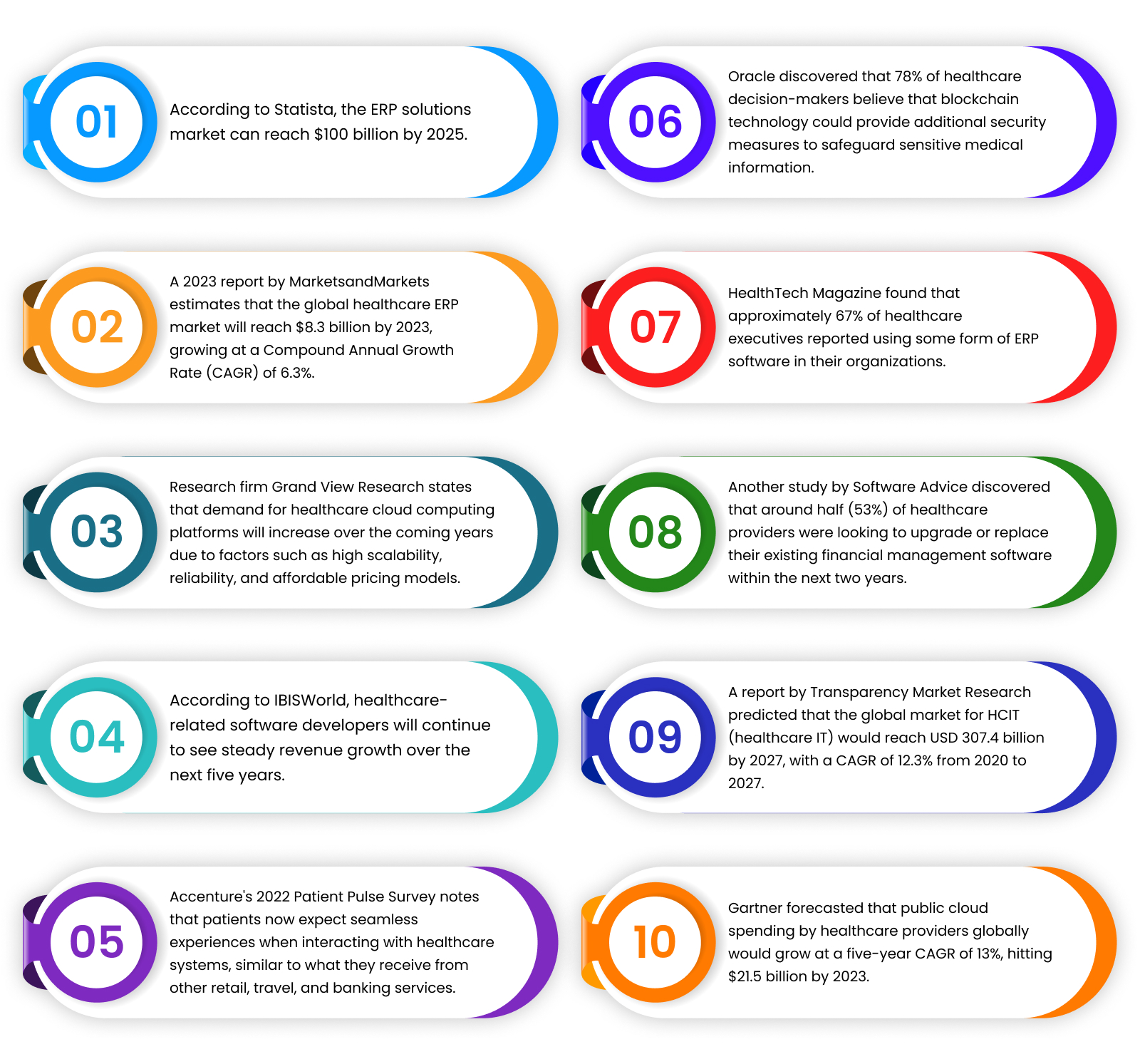
Role of ERP Systems in the healthcare industry
An ERP system helps manage core business activities such as inventory or finances for medical organizations. It refers to software that integrates business processes across functional departments such as sales, purchasing, inventory management, production scheduling, supply chain management, financial accounting, and human resources into one system.
In the healthcare industry, ERP systems play a crucial role in managing the data flow within an organization. It includes everything from patient records to financials, making it easier for hospitals, clinics, and other healthcare providers to streamline operations and improve efficiency.
Additionally, these systems often provide analytical capabilities that allow organizations to make better decisions based on data insights, improving patient care outcomes while reducing costs. Ultimately, using ERP technology effectively lets healthcare organizations focus more time and effort on delivering high-quality patient care than administrative tasks.
Types of ERP Systems in the Healthcare Industry
With the increasing complexity of the business world, companies need robust solutions to manage a wide range of activities. Enterprise resource planning (ERP) systems are integrated software suites that help organizations manage all crucial elements of their operations. These systems act as centralized repositories of critical organizational data, helping automate core business functions like finance, manufacturing, logistics, and human resource management.
ERP helps integrate diverse departmental workflows so employees can share vital information seamlessly, leading to enhanced productivity and reduced operational costs. Let us learn about the various types of ERP systems:
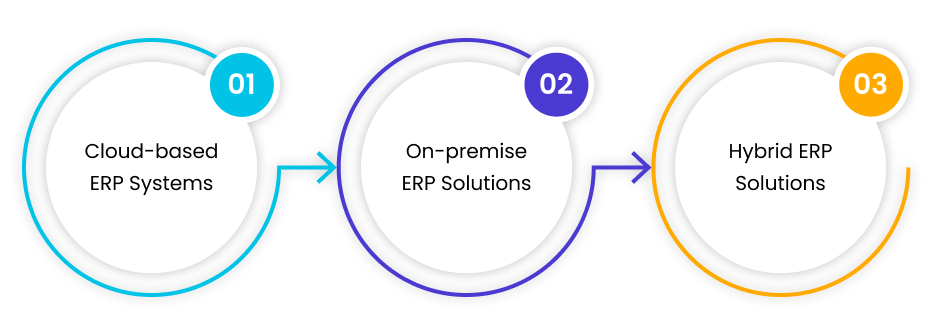
-
Cloud-Based ERP Systems: With the rise of remote workforces and globalization, companies are shifting towards cloud-hosted ERP systems. Cloud-based ERP enables multi-location data accessibility, connectivity, scalability, improved collaboration, lower maintenance costs, faster deployment times, higher security features, and automatic upgrades without additional investment in hardware infrastructure. The leading examples include Oracle NetSuite, SAP S/4HANA Cloud, and Microsoft Dynamics 365.
-
On-premise ERP Solutions: These ERP software solutions run and are installed locally on the client's side. Everything that runs on servers is located on the customer site and requires IT staff to maintain infrastructure, patch systems, apply updates, etc. Companies using on-premises software have complete control over the entire IT ecosystem. But companies need to self-manage the hardware, storage capacity, network configuration, database management, and security monitoring.
-
Hybrid ERP solutions: A hybrid ERP solution combines on-premise and cloud-based software in an enterprise resource planning (ERP) system. This approach allows companies to take advantage of the strengths of both types of ERP solutions while removing potential drawbacks. By combining on-premise systems and cloud software, organizations can achieve greater flexibility and efficiency while ensuring greater resilience and responsiveness.
What is the core feature of ERP systems in healthcare?
Enterprise Resource Planning (ERP) systems are software platforms that integrate data from different functions within a business into one system. They allow centralized management of resources such as inventory, supplies, production scheduling, sales, accounting, and finance.
An ERP system may include software components like SCM (Supply Chain Management), CRM (Customer Relationship Management), PLM (Product Lifecycle Management), and HRMS (Human Resources Management System).
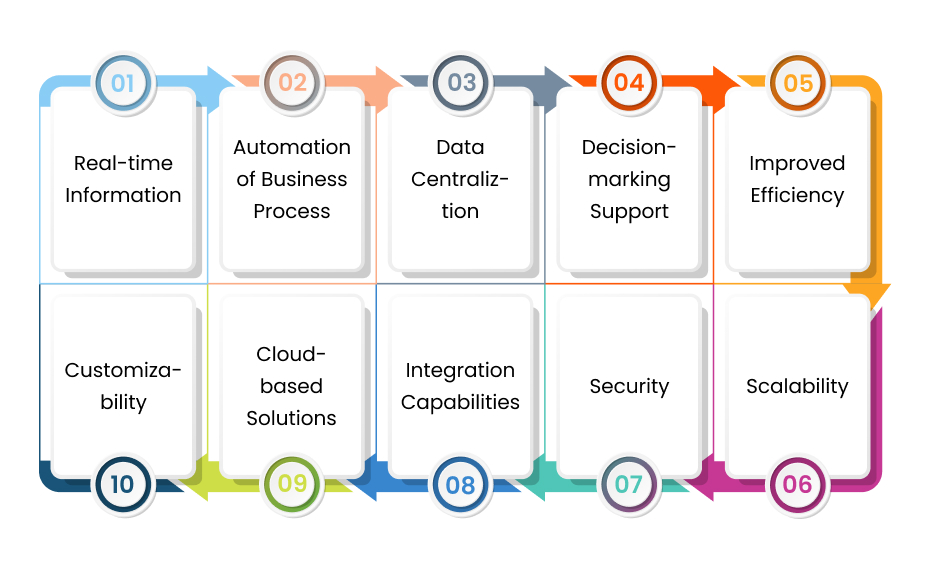
Some key features of ERP systems include:
-
Real-Time Information: Provides real-time access to operational data, including financial statements, inventory levels, supply chain status, and customer relationship metrics.
-
Automation of Business Processes: Streamlines workflows using automated tools, reducing human effort and errors. Moreover, it helps in the removal of duplicate information for healthcare employees.
-
Data Centralization: Integrates several business processes into a platform, making them accessible to all departments. This results in increased efficiency and accuracy, as there is no need to keep manual records from different sources.
-
Decision-Making Support: Provides managers with analytical insights that help them make better-informed decisions. Through dashboards and reporting modules, users can gain visibility across various dimensions of their organization and take corrective action if necessary.
-
Improved Efficiency: By integrating all aspects of a company’s operations on one platform, ERP systems reduce redundancy, enhance collaboration among teams, and lead to improved productivity. With automatic updates and alerts, employees can focus on higher-value tasks rather than administrative chores.
-
Scalability: As companies grow and diversify their product or service offerings, ERP systems provide scalability options to accommodate additional functionality requirements while reducing complexity.
-
Security: Provide robust security measures to protect sensitive data, trade secrets, etc., from hackers and other threats.
-
Integration Capabilities: Most modern ERP solutions offer connectors or APIs, allowing seamless integration with external applications and extending functionalities beyond the traditional scope of an ERP solution.
-
Cloud-Based Solutions: Many enterprises prefer cloud-based solutions, which allow them lower IT infrastructure costs, easy maintenance, flexible user authentication mechanisms, etc.
-
Customizability: ERP vendors often offer tailor-made solutions specific to industry verticals that address unique pain points faced by particular industries, thus improving overall efficiencies.
Benefits of ERP Solutions in Healthcare
ERP (Enterprise Resource Planning) solutions have become increasingly important in the modern healthcare industry. They help the healthcare industry streamline operations, reduce costs, improve efficiency, and enhance patient care.
An effective ERP system can integrate numerous functions. It includes finance, supply chain management, human resources, and payroll on one centralized platform. Here is how an ERP solution can benefit healthcare organizations:
-
Improved Financial Management: An ERP solution can provide real-time visibility into financial transactions, helping manage budgets more effectively. With the automation of financial processes, healthcare providers can save time and increase accuracy. It includes accounts payable and receivable, the general ledger, budgeting, forecasting, and expense tracking.
-
Enhanced Supply Chain Management: By integrating inventory control, purchasing, and distribution systems, an ERP solution can ensure that medical equipment and supplies are available when required while minimizing waste and overstocking. It helps reduce costs associated with managing a complex hospital environment.
-
Better Human Resources Management: An ERP system can simplify HR tasks like employee onboarding, benefits administration, performance evaluation, training, scheduling, and attendance tracking. Automation reduces paperwork and errors, improving employee satisfaction by providing self-service access to HR information.
-
Streamlined Procurement Processes: By connecting suppliers, purchase orders, vendors, receivers, invoices, and other data within a unified framework, an ERP solution ensures faster processing times and reduced costs. Real-time visibility enables mindful decision-making about procuring goods and services from preferred vendors at lower prices.
-
Optimized Operational Efficiency: An ERP system can link all departments, creating seamless communication across multiple locations. From admissions and discharges to scheduling appointments, billing, and lab results, everything flows smoothly with minimal delays.
-
Compliance Management: An ERP solution can facilitate compliance with industry regulations, including security frameworks and federal funding requirements. Integrated monitoring tools help track activities and alert administrators quickly if any breaches occur.
-
Patient Care Improvements: Physicians can gain deeper insights into their patients’ conditions by collecting clinical data in a single repository and enabling easy retrieval through reporting capabilities. It promotes better diagnostics, treatment plans, medication management, and patient outcomes.
-
Cost Containment Measures: Reducing administrative overheads by consolidating applications onto a common platform leads to significant cost savings throughout the organization. An ERP implementation also encourages process standardization across all departments, driving down expenses.
-
Data Analytics and Business Intelligence: ERP data provides valuable insights that assist with long-term planning decisions based on historical trends. Detailed reports guide budget allocations, capacity utilization optimization, staffing adjustments, and strategic investments.
-
Cloud Computing Flexibility: Many healthcare providers now prefer cloud-based ERP deployments because of scalability advantages, simplified maintenance, automatic updates, and greater data security. Additionally, mobile devices integrated into the workflow enable secure access to critical information anywhere and anytime.
Applications of ERP solutions
Healthcare enterprise resource planning (ERP) solutions play a vital role in helping organizations manage their complex operations efficiently while ensuring compliance with regulations.
Here are some applications of healthcare ERP solutions that can benefit hospitals, medical centers, and other healthcare institutions:

-
Financial Management: Healthcare ERP systems enable financial administrators to monitor accounts payables and receivables, the general ledger, budgeting, forecasting, and auditing. With all financial transactions recorded in one centralized location, finance teams can easily track spending, manage budgets, generate accurate financial statements, and ensure compliance with regulatory requirements.
-
Human Resource Management: Healthcare ERP solutions integrate human resources functions such as recruitment management, time and attendance recording, benefits administration, employee training records, and payroll processing. These features allow HR managers to manage workforce requirements effectively while following employment laws and regulations.
-
Materials Management: The healthcare supply chain involves multiple stakeholders. It makes material management challenging. ERP solutions can manage inventory levels, purchase orders, vendor contracts, and item master data to minimize stockouts and overspends while maximizing supplier relationships. Real-time analytics and automation increase accuracy in this vital area.
-
Patient Administration: Medical facilities might need to process large volumes of patient data, including appointment scheduling, admissions and discharges, insurance claims, medical history records, and billing. Integrated ERP systems simplify these processes while reducing errors and increasing efficiency, enhancing customer satisfaction.
-
Workflow Optimization: Automation done by ERP systems helps manage clinical documentation, lab requests, imaging studies, referrals, and patient education.
To conclude:
Implementing an ERP solution tailored specifically for your healthcare institution ensures optimized processes. Healthcare ERP solutions offer a comprehensive approach to organizing and optimizing hospital operations, from clinical service delivery to finances, supply management, legal affairs, and more.
While there may still be some challenges during implementation, working closely with consultants and service providers helps ensure the successful adoption of ERP systems in healthcare.
Are you looking for the most reliable ERP service providers? Look no further than ToXSL Technologies. Our premium services have helped many businesses worldwide streamline their operations. Contact us for unparalleled ERP services.




